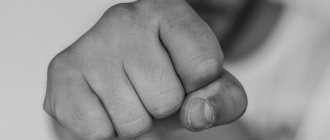Causes of bad mood during the premenstrual period
The content of the article:
Scientists are still arguing about why women experience depression during PMS and during menstruation. There are different versions of the reasons, including:
- hormonal changes in the body that cause a sharp decrease in estrogen levels;
- poor diet;
- vitamin deficiency;
- stress;
- seasonal emotional disruptions;
- dysfunction of the thyroid gland;
- various diseases of both gynecological and other areas.
It is worth noting that each version has a right to exist. For example, if any disturbances occur in the chain of interaction between hormones and the central nervous system, the entire body suffers. In particular, the level of production of dopamine, serotonin and other neurotransmitters decreases. The result is depression before, during and even after menstruation.
Poor nutrition and, as a consequence, lack of potassium, vitamins A, B6 and E in the period before menstruation make themselves felt in the form of nervous disorders, lowered pain threshold, etc.
The thyroid gland, like the gynecological organs, directly affects the production of hormones; accordingly, malfunctions cannot but affect the state of the body in general and mental balance in particular.
Factors such as personality traits and genetic predisposition to depression cannot be ruled out. If a woman is hot-tempered and irritable during the “calm” periods of the cycle, then it is quite logical that during PMS her condition will not change for the better, but will worsen even more.
Anxiety before menstruation. What is PMS or premenstrual syndrome?
Deciphering PMS in gynecology - premenstrual syndrome.
PMS manifests itself in the form of unpleasant clinical signs about a week before menstruation and lasts 2-12 days. The body is experiencing some kind of malfunction during this period of time. The functions of many organs begin to be restored only with the arrival of menstruation, or later - after their completion. It's all about hormonal changes, when physiological processes in the body begin to behave strangely. Female hormones, one way or another, affect the nervous system and, accumulating in excess, make themselves known on the eve of menstruation.
It is in this phase of the cycle that we observe:
- poor health under the influence of estrogen and progesterone;
- prostration;
- excessive irritability, nervousness.
PMS, as a syndrome before menstruation, begins to show excessive sensitivity to these hormones. Such changes in physical condition are caused by an emotional background, when women become nervous, touchy, and experience tension.
The syndrome often manifests itself in combination, because the hormonal background undergoes changes, and microelements experience an imbalance.
This translates into:
- discomfort;
- tearfulness;
- excessive overvoltage;
- swelling of the mammary glands;
- nagging pain in the lower abdomen.
Often women confuse pregnancy and PMS, although there is nothing in common. According to statistics, the syndrome occurs when a certain age is reached; young girls and teenage girls should not have it.
As a rule, girls do not experience this phenomenon, but older European women of childbearing age (30-40 years old) experience painful PMS in almost 60% of cases. The phenomenon is typical in the premenopausal period, when it manifests itself with more vivid symptoms.
Blame it all:
- intellectual increased load,
- body weight deficiency,
- stress,
- physical stress,
- lack of sleep,
- poor nutrition.
Methods to combat depression
There is no single recipe for immediate improvement during PMS. It is important to understand that you should fight precisely the reasons that cause the symptoms listed above. If the woman herself cannot do this, and the situation only gets worse over and over again, then the best option is to see a specialist. Depending on the results of the examination, your doctor may prescribe the following medications for depression:
- Antidepressants - to relieve anxiety, improve mood and emotional state.
- Herbal remedies are herbal preparations that have a mild sedative effect.
- Dietary supplements and vitamins - if the cause of depression is a lack of nutrients, minerals, etc.
- Nootropics, anxiolytics and sedatives – against anxiety and insomnia, to improve overall tone.
See also: Phases of the menstrual cycle: daily diagram
In rare cases, when the patient’s symptoms of PMS are numerous and pronounced, hormonal therapy may be prescribed. It is quite possible that more pleasant methods will help correct the situation, for example, physiotherapy - massages, acupuncture. The doctor will definitely recommend that a woman who is struggling with depression review her diet. In particular, exclude salty, smoked, spicy foods, replacing them with dairy products, fish, fruits, various nuts and even everyone’s favorite chocolate.
Irritability before menstruation - how to get rid of it?
The woman is mysterious. It is so difficult to unravel that many men spend their entire lives trying to figure it out. It can be changeable in mood and unpredictable in everyday life, but when it comes to hormonal changes in the body, this becomes even more noticeable.
Unraveling the woman, scientists connected all this with each other and found that the relationship that exists between the psychological state and PMS is explained in different ways. If irritability during pregnancy is explained by the emotional state of the woman, then the cause in this case may be not only the mental state, but also physiology and even toxic substances accumulated in the body.
To find out for sure, a clinical study of the symptoms and causes of such irritability during menstruation will be required.
Why are women so irritable during PMS?
A week and a half before the next menstrual cycle, changes in a woman’s behavior are observed.
Olympic calm can be replaced by violent anger, a charming appearance on a romantic evening can be replaced in the morning by malaise, swollen eyelids and a disgusting mood.
All these are symptoms of upcoming menstruation, which are visible to the naked eye. If PMS is calmer in young people, then after 34-37 years you can expect anything from a woman.
What scientists say
Many researchers argue that such mood swings are a consequence of an imbalance of progesterone and estrogen in the body.
If more estrogen is released, then aggression appears, and progesterone is characterized by fatigue and depression.
During this period, there is stagnation of blood in the blood vessels, an increase in body weight, and painful sensations in the chest. Hence the rise in temperature, poor sleep, and irritability.
Other versions of the appearance of PMS
Vitamin deficiency and impaired water-salt metabolism can lead to intoxication of the body. Now, in addition to discomfort and physical pain, a whole complex of psycho-emotional symptoms is added, which are even more important.
Mistakes women make with PMS that increase irritability
On the eve of the menstrual cycle, the entire female body is relaxed, and it can be supported by high-calorie foods. Many people think so. Of course, this is a misconception.
Feeling sorry for yourself, and even more so, eating up your bad mood is unacceptable, because new problems with appearance and body weight will begin to appear.
If you want to forget about everything and plunge into the world of pleasant taste sensations, you need to understand that high-calorie foods will not help satisfy all your needs for vitamins and minerals, but will only bring problems. Only balanced nutrition will ensure proper metabolism.
Another mistake is limiting yourself to sports. For some reason, there is an opinion that this causes the body to experience a certain amount of stress. Of course, this is not true either.
You need to move even more, aerobics, brisk walking, and sports exercises are especially useful, which will not only relieve stress, but also activate all the body’s forces, bringing hormones into balance.
If a woman plays sports, her back, pelvic and abdominal muscles are strong, which means that difficult days will be less painful and irritability will not even arise during menstruation.
Fighting weight is another mistake. During the premenstrual period, weight fluctuates, it’s true. But you can't fight him. No diet can change nature, and if kilograms still appear, then it is better to pacify your appetite and try to eat foods with less calories.
How do you cope with PMS?
Naturally, everyone's reaction to the upcoming monthly cycle is different. It all depends on age, character, and even external circumstances. Therefore, to understand whether you are experiencing premenstrual syndrome, you can look at the symptoms you have.
So, think about how deep the depressive state is, is tension clearly expressed? How often does sadness occur during this period, does your mood change, or does apathy appear? Do you get irritated at every occasion or get into conflicts? Also during this period, absent-mindedness appears, interest in what was recently attractive decreases. Notice whether your appetite changes, does the desire to overeat appear, or self-control is lost? Many people quickly get tired, drowsiness or, conversely, insomnia appears. If you regretfully answer “Yes” to all questions, then this is PMS and you will have to put up with irritability. You just need to help yourself live with it correctly. In especially severe cases, women have uncontrollable outbursts of anger these days.
How to get rid of irritability during PMS?
Many people believe that irritability does not require treatment. But it is not so. A complex impact on PMS is a whole group of actions. The use of synthetic analogues of gestagen, the missing hormone. The emphasis in nutrition is on calcium, potassium, magnesium, vitamins A and E.
If necessary, other elements are added. As for a special diet, it is not needed, but making sure that nothing unnecessary gets into the body and doing physical exercise is certainly necessary. Swim, walk, dance - it never hurt anyone.
Add fiber to your diet, minimize proteins, which will only increase the need for mineral salts, thereby disrupting water-salt metabolism. Drinks containing a high caffeine content are extremely undesirable. These are the basics.
But you can take a number of other actions, even if there is no doctor nearby.
A week before your period, you can reduce salt in your diet, leaving no more than 3 grams. Remember that it causes fluid retention, which accumulates in the brain tissue, adds an extra 2-3 kilograms during this time, and increases breast sensitivity. And all these points affect irritability before and after menstruation.
If you are not feeling very well, rest. You can lie down with a book and find a pleasant activity. Don't limit yourself, satisfy your little weaknesses and whims.
You can drink a complex of vitamins, minerals, and herbs that will alleviate ailments. At the same time, you should not drink alcohol or a lot of caffeine. They aggravate feelings and instill negative thoughts. Food should also be less spicy, fatty and overly sweet.
Avoid large amounts of chocolate, because during PMS, many women want to eat it in excess.
Most nutritionists say that caffeine and excess sugar very quickly destroy the body's B vitamins, which help the body resist fatigue.
Limiting fluids 5-10 days before your period starts will help reduce swelling. If necessary, drink diuretics, the best of them are herbal teas or mineral waters.
In addition to all this, irritability during menstruation indicates that you have a generally high level of irritation or otherwise dissatisfaction with life. Therefore, a good solution would be to work with a psychologist aimed at reducing the overall level of irritation. Note that calm girls are also calm these days.
And try not to get irritated for no reason, so as not to show the whole world that your period is coming very soon. Give yourself healthy sleep, proper nutrition, walk in the fresh air, and relax.
Source: https://chuvstvuju.ru/razdrazhitelnost-pered-mesyachnymi
Results
Depression before menstruation is not a reason to panic, which will aggravate an already not the best condition. For all women without exception, PMS is accompanied by mood swings, depression, mood swings and other “surprises” of a psychological nature. The main thing in such a situation is to adhere to the rule of the golden mean: do not focus on the symptoms that appear, but also do not ignore them if you notice that they have intensified or prolonged too much.
See also: Will you have periods after hysterectomy or not?
Try to switch to positive aspects, take up your favorite hobby during this period, spend more time with loved ones, ideally in the fresh air and, if your physical condition allows, playing active games. To please your loved one, go to a restaurant and try dishes that you haven’t risked eating before for fear of ruining your figure. The extra grams will quickly disappear, but the good mood from aesthetic and gastronomic pleasure will remain for a long time. Don't be afraid to give vent to negativity. In this case, all methods of control are acceptable. If you want to break the dishes, hit them. If you want to cry, cry without hesitation. If you have a desire to kill someone, go to the shooting range to let off some steam. And with such a turn of events, no depression will have the slightest chance!
How much did the article help you?
[Total votes: 2 Average: 3.5/5]
Symptoms
We list the most characteristic symptoms:
- sudden mood swings;
- increased absent-mindedness and weakness;
- feeling of constant causeless anxiety;
- mild emotional vulnerability, tearfulness;
- causeless aggressiveness and outbursts of anger;
- headache;
- sleep disturbance, insomnia;
- sudden transition to salty or sweet foods.
For a woman, such symptoms may go unnoticed, but for the people around her, no. People notice changes and disturbances, primarily with normal sleep. During the day, women feel overwhelmed, feel lethargic, and lose their appetite. The whole body hurts, the joints are twisted, the state is completely broken. What is the way out of this situation? If you do not seek qualified help in time, then in the most severe cases a woman may commit suicide. Psychotherapeutic correction is extremely necessary.
How to suspect something is wrong
The gait becomes slow, the legs have difficulty lifting off the floor. Any homework is postponed indefinitely. A mountain of unwashed dishes becomes commonplace.
A woman cannot always overcome depression alone. Close people should rush to help.
To overcome this disease, it is important to first make changes to your diet. It is important to enrich it with foods containing vitamin B6 and potassium. These are dairy products, fish, eggs. Many fruits also contain them - bananas, apples. Dried apricots are also useful.
Limiting cups of coffee per day will help preserve magnesium. In addition, magnesium is found in large quantities in wheat bran and wheat sprouts. It's a good idea to start eating these foods daily.
To reduce swelling, a woman can prepare decoctions of diuretic herbs - rose hips, parsley, shepherd's purse. It is better to steam rose hips with boiling water and leave until the water acquires a beautiful reddish tint. It is good to drink this drink instead of tea. A slice of lemon can complement the flavor. A serving for one day consists of three rose hips.
Parsley is rich in magnesium. As is known, a lack of this ion leads to a deterioration in mood. Parsley can be added fresh to salads or juiced.
Physical exercise
A woman should not refuse to play sports. Which sport to choose needs to be chosen individually. It depends on the patient herself. If you don’t have a favorite sport, you can just do brisk walking. In good weather, it’s easy to choose a suitable route and additionally, as a bonus, get a portion of fresh air.
Irritability and insidious syndrome
As women have repeatedly noted to themselves, the peculiarity of premenstrual syndrome is that in ordinary life you are one person (calm and balanced, who knows how to enjoy life), but with the onset of PMS you are a completely different, extremely irritable person. Mood swings, irritability, touchiness, tearfulness…. In short, a whole range of negative emotions that you naturally splash out on your family and friends. And not because you are such a bad wife, mother, friend, daughter... But because you are simply torn apart and you are desperately waiting for this menstruation to finally come!
In addition, not all women are left with irritability after the start of menstruation, while others are forced to struggle with their irritability until the end of the cycle - another 5-6 days! Of course, irritability leaves an imprint on the microclimate in the family, on relationships with your husband, children, parents, friends and employees. And this, in turn, cannot but upset the woman herself. But not everything is so scary - it is in your power to prevent irritability during PMS from becoming the cause of quarrels and conflicts with people dear to you.
How to deal with depression
Diet correction
Since water retention occurs in the period before menstruation, it is important to cook food with a small amount of salt. To ensure that the food is tasty and there is little salt, it is better to add it to the dish at the very end of the cooking process.
If this does not suit a woman, walking can easily be replaced with swimming or dancing. The main thing is not to give the body slack and force it to switch from mental discomfort to physical fatigue.
Shock therapy for a woman’s brain is breathing exercises with holding her breath as she exhales. Performing any exercises with holding your breath after exhaling causes the nerve cells to perk up and begin to function more actively.
Give vent to negativity
Don't bottle up your emotions inside yourself. We need to throw them out. All means are good here:
Engaging in a favorite hobby will help relieve nervous tension. The main thing is that this activity should be calm, monotonous, relaxing - knitting, embroidery, clay modeling.
Products with magnesium are widely used to eliminate women's problems. This ion can affect:
Nootropic drugs have a specific effect on the condition of a woman during her period. These substances can stimulate brain activity. At the same time, the woman’s memory and mood will improve, she will be able to better concentrate on things that interest her. She will become interested in her surroundings and depression will disappear. The right decisions will come to mind faster.
Main reasons
Experts have long found an explanation for a woman’s depressive state – changes in hormones. Before the onset of menstruation (days 21–28), the amount of estrogen decreases sharply, and if the hormone is taken orally, it will still not help.
Some scientists believe that depression is caused by:
- Emotional disorders.
- Seasonal disorders.
- Thyroid diseases.
- Experienced stress.
Most often, depression is characteristic of neuropathic, hysterical women with an unstable psyche. Sometimes the cause of depression can be poor nutrition. If you change it, you can get rid of some unpleasant symptoms.
What are women's mistakes?
First of all, in poor nutrition. You should limit your consumption of high-calorie foods. It is unacceptable to eat into a bad mood. This will immediately affect the increase in body weight.
The second mistake is the refusal of an active lifestyle. Women believe that playing sports can be harmful. This opinion is wrong. Time has shown that movement makes you feel better, so move more. Daily walks relieve stress, balance hormones, and smooth out irritability.
Another mistake is the active fight against excess weight. PMS is marked by an increase in extra pounds. However, this phenomenon is temporary. No struggle is required here, especially do not take fat burning pills.
Treatment
The severity of the depressive state is determined by doctors. The course of prescribed treatment depends on this.
To overcome depression, specialists can prescribe the following medications:
- sedatives and antidepressants;
- contraceptive hormonal drugs (allow you to relieve the most unpleasant symptoms);
- drugs to stimulate blood circulation in the brain;
- taking vitamin-mineral complexes (minerals - calcium, zinc, iron, magnesium B6; vitamins - A, B, C).
General therapy
The course of treatment includes the following methods:
- therapeutic;
- physiotherapy;
- massage, both classic and acupressure;
- reflexology;
- acupuncture sessions;
Phytotherapy
To prevent depression, experts recommend taking phytohormones with estrogens. This course will bring the level of hormones in the blood to an optimal state. The following plants are recommended as herbal medicine:
- common wormwood (relieves muscle and vascular spasms);
- black cohosh (cohosh rhizomes);
- bearberry (antiseptic, relieves swelling).
Tea mixtures made from oregano, motherwort, hop cones, lemon balm, peony roots and mint will help relieve increased excitability, normalize sleep, and reduce nervous stress.
Soothing baths
Taking relaxing baths with the addition of various components of natural origin, according to experts, will help reduce the likelihood of depression. Essential oils of lavender and lemon wormwood are used as additives. Foot baths with lemon balm, cucumber, and rose petals are also effective. After the bath, massage your feet using fir oil. To normalize sleep, use pillows with various fillings:
- lavender color;
- currant leaf;
- mint leaves;
- oregano herb.











